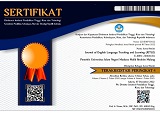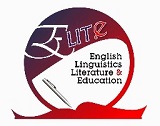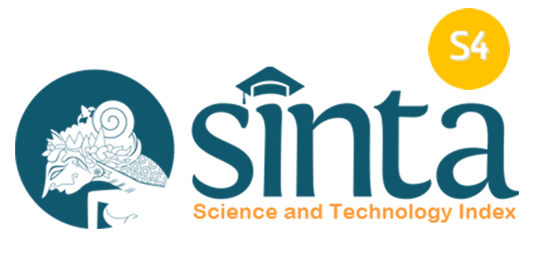Insertion of the values of religious moderation on Indonesian EFL class
Abstract
English as a Foreign Language (EFL) means learning English in a non-English speaking country, for example, Thailand and Indonesia. Admittedly, EFL educators encourage the student to improve their English skills such as listening, speaking, reading, and writing skills. In writing skills, teaching vocabulary has important points. Focusing on learning English vocabulary that inserts the value of religious moderation, this research took a case study in an Islamic primary school in Malang on Indonesian EFL Class. With a qualitative case study, the researcher addressed two main methods for two Indonesian EFL students and teachers in Malang. By using reflective essays and interviews as the methods, the data concluded that most of the challenges found had similarities and related to each other. Along with the challenges, the researcher also found out the strategies done by all of the participants such as implementing the values of religious moderation as a way of teaching vocabulary, enriching the student’s vocabulary, and improving the student’s writing English skills.
Keywords
Full Text:
PDFReferences
Ali, N. (2020). Measuring religious moderation among Muslim students at public colleges in Kalimantan facing disruption era. INFERENSI: Jurnal Penelitian Sosial Keagamaan, 14(1), 1–24. https://doi.org/10.18326/infsl3.v14i1.1-24
Alqahtani, Mo. (2015). The importance of vocabulary in language learning and how to be taught. International Journal of Teaching and Education, 3(3), 21–34. https://doi.org/10.20472/TE.2015.3.3.002.
Amalia, H., Abdullah, F. & Fatimah, A. S. (2021). Teaching writing to junior high school students: A focus on challenges and solutions. Journal of Language and Linguistic Studies, 17(2), 794–810.
Bogdan, Robert C. & Knop, Sari Biklen. (1982). Qualitative research for education, An introduction on theory and methods (5th ed.).Allin and Bacon.
Cahyani, N. M. W. S. Suwastini, N. K. A. Dantes, G. R. Jayantini, I. G. A. S. R. & Susanthi, I. G. A. A. D. (2021). Blended online learning: Combining the strengths of synchronous and asynchronous online learning in EFL context. Jurnal Pendidikan Teknologi Dan Kejuruan, 18(2), 174. https://Doi.Org/10.23887/Jptk-Undiksha.V18i2.34659
Dehham, S. H. (2021). Iraqi EFL students ’ ability in acquiring English vocabulary by peer instruction technology. Turkish Journal of Computer and Mathematics Education, 12(9), 1634–1639.
Deni, R. & Fahriany. (2020). Teachers’ perspective on strategy for teaching English vocabulary to young learners. Vision Journal, 9(1), 47–60.
Fajrina, Dian & Everatt, John. (2021). Writing strategies used by Indonesian EFL students with different english proficiency. Language Teaching Research Quarterly, 21(1), 1–15.
Hibatullah, O. F. (2019). The challenges of international EFL students to learn english in a non-english speaking country. Journal of Foreign Languange Teaching and Learning, 4(2). https://doi.Org/10.18196/ftl.4240.
Kainta, Erwin. (2020). Exploring students ’ motivation and vocabulary achievement through labeling method. Vision Journal, 9(1), 1–16.
Makmur, A. Mukhlash, Mukminin. Amirul, Habibi. Akhmad, Asyrafi Fadhil. Makmur, & Marzulina, L. (2018). If our English isn’t a language, what is it?" Indonesian EFL student teachers’ challenges speaking English. Qualitative Report, 23(1), 129–145. https://doi.org/10.46743/2160-3715/2018.3013.
Marzulina, Lenny. Erlina, Dian. Pitaloka, Nova Lingga. & Paramika, Florensia Anggarde. (2019). Looking at the link between study habits and academic achievement: the case of indonesian EFL student teachers. Indonesian Research Journal In Education |Irje|, 3(1), 56–57. https://Doi.Org/10.22437/Irje.V3i1.6507.
Mauludin, L Ashar. (2015). The importance of non-native English speaker teachers in the context of English as a foreign language. Transformatika, 13(3), 1576–1580.
Nasution, A. K. R. (2019). YouTube as a media in English language teaching (ELT) context: Teaching procedure text. Utamax : Journal of Ultimate Research and Trends in Education, 1(1), Article 1. https://doi.org/10.31849/utamax.v1i1.2788
Nugraha, Dera. Arifin, Bambang Samsul. & Ruswandi, Uus. (2020). The Implementation of religious moderation values in Islamic education learning at Cendekia Islamic junior high school, Cianjur regency, Indonesia. Kuriositas: Media Komunikasi Sosial Dan Keagamaan, 13(18).
Octaberlina, L. R. & Anggarini, I. F. (2020). Teaching vocabulary through picture cards in Islamic elementary school: A case study in Nida Suksa School, Thailand. Madrasah, 13(1), 26–38. https://Doi.Org/10.18860/Mad.V13i1.9649
Octaberlina, L. R.. & Rofiki, I. (2021). Using online game for indonesian EFL learners to enrich vocabulary. International Journal of Interactive Mobile Technologies, 15(1), 168–183. https://doi.Org/10.3991/ijim.V15i01.17513
Pipuš, Darja. (2021). Introducing vocabulary in the EFL classroom. 27–47. Proceeding 3rd International Academic Conference on Teaching, Learning and Education. Munich Germany
Putri, Vincentia Aprilla. (2020). Experiences and challenges perceived by Indonesian EFL teachers as non-native English speaker teachers ( nnests ) in thailand. Vision (Placeholder1)Journal, 9(1), 61–79.
Rohmana, Wahyu Indah Mala. (2020). Immersing Islamic values language teaching: a challenge for English teachers. SCOPE: Jurnal of English Language Teaching, 4(2), 47-50. https://dx.doi.org/10.30998/scope.v5il.6404
Rusla, Idrus. (2021). The idea of religious moderation in Indonesian new order and the reform era. Jurnal Ilmu Ushuluddin, 8(1), 22. https://doi.org/10.15408/Iu.V8i1.19618
Seashore. (1948). The importance of vocabulary in learning language skills. Jstor, 25(3), 1357–1362.
Suhardiana, I. P. Andre. (2021). Attitudes of EFL students regarding learner autonomy. Yavana Bhāshā: Journal Of English Language Educatio, 4(2), 67–80.
Wong, Alice Su Chu. & Lee, Jocelyn Yee Vun. (2020). Investigating the predictive role of vocabulary in written written performance. Borneo Akademika, 72–85.
Yin, R. K. (2011). Qualitative research from start to finish. The Guildford Press.
DOI: https://doi.org/10.18860/jetle.v4i1.17744
Refbacks
- There are currently no refbacks.
Jalan Gajayana 50 Malang 65144, Jawa Timur, Indonesia

This work is licensed under a Creative Commons Attribution-ShareAlike 4.0 International License.
Indexed by





